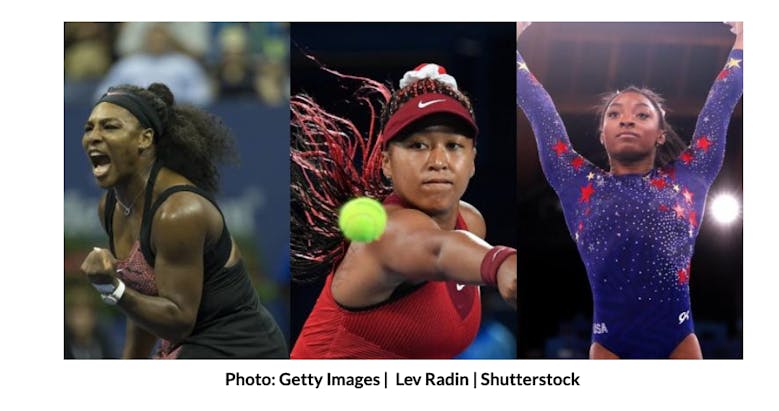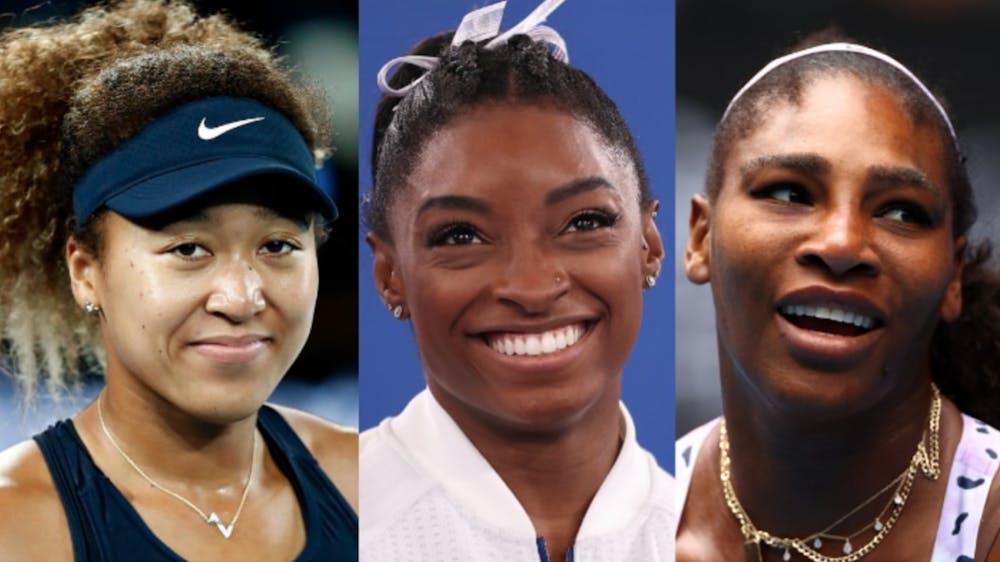
On July 26, 2021, American gymnast Simone Biles took the opportunity to open up about the 2020 Tokyo Olympics and how peoples’ unrealistic expectations for her have been extremely overwhelming. “I truly do feel like I have the weight of the world on my shoulders at times,” Biles wrote in the caption. “I know I brush it off and make it seem like pressure doesn’t affect me but damn sometimes it’s hard hahaha!”
The sentiment Biles shared reflects the experience of many athletes. Athletes are placed on a particularly high pedestal to constantly outdo themselves no matter the circumstances. When those demands are not met, they are heavily criticized. These athletes face immense pressure and are often reduced to their accomplishments and are viewed as objects that fulfill our entertainment desires, rather than individuals with real feelings.
This pressure weighs much heavier for Black female athletes. During the 2020 Tokyo Olympics this past summer, Simone Biles made the brave decision to withdraw from two Olympic gymnastic competitions. Biles mentioned that she had been suffering from the "twisties," which she described as the strange feeling where “she cannot tell up from down." This mental block causes her to lose control of her body while she is in the air. She also stepped back from competing in the individual all-around final, expressing the need to prioritize her mental health. She received an outpouring of love and support from her fans and other sports athletes who could relate to this situation; Michael McCahey, a professional fencer, reflected on “the great pressure he was under during Olympic events” and expressed sympathy for Biles. U.S Olympic swimmer Katie Ledecky expressed that she faces similar pressure as Biles, stating that “Olympians have the most eyes on us of anyone in the world.” But, unfortunately, Biles’s decision also faced backlash from the public. In an opinionated piece for the Daily Mail, British broadcaster Piers Morgan described Biles as a "let down to her country, teammates, and fans." During an episode of the "Charlie Kirk Show Podcast," conservative activist Charlie Kirk said, "We are raising a generation of weak people like Simone Biles," in response to her withdrawal.
Biles is not the only Black female athlete who has been criticized for prioritizing her mental health. Naomi Osaka, a four-time Grand Slam singles tennis champion, faced similar backlash when she withdrew from the French Open and The Championships Wimbledon. She cited her struggles with social anxiety, depression, social media pressure, and simply wanting to spend more time with her family and friends. Not only was she fined $15,000 as a result, but critics were quick to attack Osaka, calling her an "arrogant spoiled brat" who displayed "diva-like behavior." Serena Williams, a 23 Gram Slam single winner and tennis player, has also had her fair share of experiences being torn to shreds by the media. Mark Knight, a cartoonist for the Herald Sun's newspaper, illustrated a racist and sexist depiction of Williams stomping on her tennis racket and throwing a tantrum resulting from her loss against Osaka in the 2018 U.S Open Final; perpetuating the harmful stereotype of the "angry Black woman."
The similarities between these three athletes are very apparent: they are Black women, and they have all been subject to critics' degradation of their character because of their identity. Unlike their white counterparts, Black female athletes are hardly given the opportunity to make mistakes, they have to work twice as hard to prove their worthiness, all while having to cope with the intersections of race and gender-based violence that they experience, which can significantly deteriorate their overall well being. The unfair scrutiny Biles, Osaka, and Williams have undergone is wrong and unacceptable, but unfortunately, we live in a society where Black women are expected to endure the struggles and pain they experience while simultaneously carrying the rest of the world on their backs. Also known as the “Strong Black Woman” stereotype which traces back to the days of slavery, this trope dehumanizes Black women by preventing them from addressing their emotions and burdens and forces them to adopt the “superwoman” role, sacrificing their own needs for the needs of others. As Black women, we do not have the luxury of being vulnerable and communicating how we feel. The strong black woman trope paints us as independent women who don’t need help from anyone else and fails to acknowledge that like everyone else, we are human too. This is a trope that affects me personally as the first-born daughter in a Black immigrant household, I have been expected to set good examples for not only my younger sister but some of my younger cousins as well. It often takes a toll on my mental health, knowing that I have to maintain my reputation of being “the perfect daughter” who does no wrong because if I don’t, it will send a bad message to the people who look up to me or are inspired by me.
From here on out, the Olympics and other major sporting events must recognize the mental needs of their Black female participants and advocate for the upkeep of their well-being. This can be done by investing in proper mental health resources that will allow Black female athletes to communicate their concerns to professionals who look like them and resonate with the experiences they go through. It’s finally time for the world to stop being blind to the systems that continue to oppress Black female athletes, and show up for them like they show up for everyone else.



